 Research has shown the aging process may cause toenails to gradually become brittle, and the feet may lose cushioning. Additionally, seniors may experience circulation issues, which may cause existing wounds to heal slower. It is beneficial to walk frequently throughout the day and perform gentle stretching exercises that can help to improve circulation. It’s important for elderly people to wear shoes that fit correctly, assuring there is ample room for the toes to move freely in. This may be helpful in preventing painful foot conditions from developing, including bunions, hammertoes, and ingrown toenails. The feet will generally feel better when a moisturizer is applied daily, and appropriate shoes are worn in warm and moist environments. These practices may be helpful in preventing cracked heels and athlete’s foot. If you would like additional information about how to care for elderly feet, it is suggested that you consult with a podiatrist.
Research has shown the aging process may cause toenails to gradually become brittle, and the feet may lose cushioning. Additionally, seniors may experience circulation issues, which may cause existing wounds to heal slower. It is beneficial to walk frequently throughout the day and perform gentle stretching exercises that can help to improve circulation. It’s important for elderly people to wear shoes that fit correctly, assuring there is ample room for the toes to move freely in. This may be helpful in preventing painful foot conditions from developing, including bunions, hammertoes, and ingrown toenails. The feet will generally feel better when a moisturizer is applied daily, and appropriate shoes are worn in warm and moist environments. These practices may be helpful in preventing cracked heels and athlete’s foot. If you would like additional information about how to care for elderly feet, it is suggested that you consult with a podiatrist.
Proper foot care is something many older adults forget to consider. If you have any concerns about your Feet, contact Brent Harwood, DPM from Southeast Podiatry. Our doctor can provide the care you need to keep you pain-free and on your feet.
The Elderly and Their Feet
As we age we start to notice many changes in our body, but the elder population may not notice them right away. Medical conditions may prevent the elderly to take notice of their foot health right away. Poor vision is a lead contributor to not taking action for the elderly.
Common Conditions
Susceptible Infections
Diabetes and poor circulation can cause general loss of sensitivity over the years, turning a simple cut into a serious issue.
If you have any questions please feel free to contact one of our offices located in Fairhope, Brewton, and Atmore, AL . We offer the newest diagnostic and treatment technologies for all your foot care needs.
Read more about Taking Care of Elderly Feet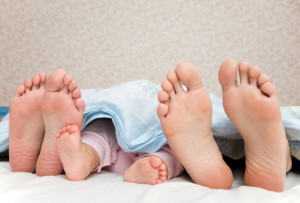 When parents give their children daily baths, it is suggested that special attention be given to their feet. It is important to wash and dry thoroughly between the toes, and it may feel good to sprinkle a small amount of powder on the toes. Many parents underestimate the importance of wearing socks that fit correctly. When the right socks are worn, the feet will generally have ample room to grow. This is followed by choosing the correct size shoes, and this can be determined by having the feet properly measured. When children are indoors, the feet can become stronger while walking barefoot. When walking begins and the first shoes are purchased, it is beneficial to choose shoes that are made of breathable materials, in addition to having adequate room for the toes to move freely in. When the toenails are trimmed, ingrown toenails may be avoided when the nails are trimmed straight across the toe. If you would like additional information about the correct foot care for children, please consult with a podiatrist.
When parents give their children daily baths, it is suggested that special attention be given to their feet. It is important to wash and dry thoroughly between the toes, and it may feel good to sprinkle a small amount of powder on the toes. Many parents underestimate the importance of wearing socks that fit correctly. When the right socks are worn, the feet will generally have ample room to grow. This is followed by choosing the correct size shoes, and this can be determined by having the feet properly measured. When children are indoors, the feet can become stronger while walking barefoot. When walking begins and the first shoes are purchased, it is beneficial to choose shoes that are made of breathable materials, in addition to having adequate room for the toes to move freely in. When the toenails are trimmed, ingrown toenails may be avoided when the nails are trimmed straight across the toe. If you would like additional information about the correct foot care for children, please consult with a podiatrist.
The health of a child’s feet is vital to their overall well-being. If you have any questions regarding foot health, contact Brent Harwood, DPM of Southeast Podiatry. Our doctor can provide the care you need to keep you pain-free and on your feet.
Tips for Keeping Children's Feet Healthy
If you have any questions, please feel free to contact one of our offices located in Fairhope, Brewton, and Atmore, AL . We offer the newest diagnostic and treatment technologies for all your foot care needs.
Read more about How to Care for Your Child's Feet Research has shown the importance for elderly people to properly take care of their feet. It may be difficult for seniors to bend down to trim their toenails, and they may benefit from having a caregiver or a relative help them accomplish this. If the patient is diabetic, any cuts, scrapes, or wounds on the feet need to be treated as quickly as possible. This can be helpful in preventing any infections from developing. Additionally, wearing socks that fit properly may be helpful controlling existing circulation conditions. The feet may change size as the aging process occurs, and it is suggested that the feet get measured regularly. This will help in determining the correct shoe size that will be comfortable to wear. Elderly patients may find it feels good to frequently stretch their feet, and this may benefit the overall health of the feet. If you would like additional information about how to help geriatric patients properly care for their feet, it is suggested that you consult with a podiatrist.
Research has shown the importance for elderly people to properly take care of their feet. It may be difficult for seniors to bend down to trim their toenails, and they may benefit from having a caregiver or a relative help them accomplish this. If the patient is diabetic, any cuts, scrapes, or wounds on the feet need to be treated as quickly as possible. This can be helpful in preventing any infections from developing. Additionally, wearing socks that fit properly may be helpful controlling existing circulation conditions. The feet may change size as the aging process occurs, and it is suggested that the feet get measured regularly. This will help in determining the correct shoe size that will be comfortable to wear. Elderly patients may find it feels good to frequently stretch their feet, and this may benefit the overall health of the feet. If you would like additional information about how to help geriatric patients properly care for their feet, it is suggested that you consult with a podiatrist.
If you need your feet checked, contact Brent Harwood, DPM of Southeast Podiatry. Our doctor will attend to all of your foot needs and provide you with quality treatment.
Geriatrics and Podiatry
When people age, some common issues that may occur are bone density loss, dry skin, poor circulation, and rough brittle nails. These issues may also affect your foot health if the necessary steps are not taken to alleviate the problems.
It is important to take care of your feet because feet that are injured or diseased can affect your overall health. Having painful feet hinders your ability to do daily activities or may decrease your willingness to do the things that you need to do.
Visiting Your Geriatrician
As we age, health problems become more likely, so it is essential to visit your doctor for check-ups to ensure that you are doing the best you can to take care of your health. It is recommended to check your feet frequently for any possible cuts, bruises, swelling, corns or any other irregularities.
Taking Care of Elderly Feet
Cracked or dry feet can be treated by applying moisturizer often. It is also important not to wear old socks because the older the sock is, the higher the possibility there will be that there is bacteria there. Wear fresh socks and make sure they fit properly.
Proper foot health means that you can have a more active lifestyle and you will not be bogged down by pain. Foot health also leads to good circulation, which is paramount for overall health.
If you have any questions, please feel free to contact one of our offices located in Fairhope, Brewton, and Atmore, AL . We offer the newest diagnostic tools and technology to treat your foot care needs.
Read more about Geriatrics and Podiatry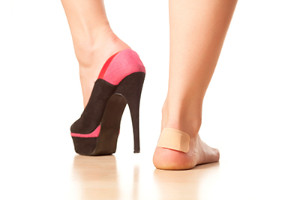 If you frequently wear high heels, you may be prone to having sore and aching feet. This may be a result of the unnatural position the feet are in while wearing these types of shoes. There may be specific foot conditions that can develop from wearing high heels. These can include ingrown toenails and hammertoes, which can happen if there is a limited amount of room for the toes to move freely in. Additionally, it may be easier to fall, which may cause an ankle injury. If you choose to wear high heels, it may be beneficial to alternate days by wearing shoes with a lower heel. Research has indicated it may be beneficial to perform gentle stretches, which may help to strengthen the calves and to keep the feet strong. If you would like additional information about the possible dangers high heels can have on the feet, please consult with a podiatrist.
If you frequently wear high heels, you may be prone to having sore and aching feet. This may be a result of the unnatural position the feet are in while wearing these types of shoes. There may be specific foot conditions that can develop from wearing high heels. These can include ingrown toenails and hammertoes, which can happen if there is a limited amount of room for the toes to move freely in. Additionally, it may be easier to fall, which may cause an ankle injury. If you choose to wear high heels, it may be beneficial to alternate days by wearing shoes with a lower heel. Research has indicated it may be beneficial to perform gentle stretches, which may help to strengthen the calves and to keep the feet strong. If you would like additional information about the possible dangers high heels can have on the feet, please consult with a podiatrist.
High heels have a history of causing foot and ankle problems. If you have any concerns about your feet or ankles, contact Brent Harwood, DPM from Southeast Podiatry. Our doctor can provide the care you need to keep you pain-free and on your feet.
Effects of High Heels on the Feet
High heels are popular shoes among women because of their many styles and societal appeal. Despite this, high heels can still cause many health problems if worn too frequently.
Which Parts of My Body Will Be Affected by High Heels?
What Kinds of Foot Problems Can Develop from Wearing High Heels?
How Can I Still Wear High Heels and Maintain Foot Health?
If you want to wear high heeled shoes, make sure that you are not wearing them every day, as this will help prevent long term physical problems. Try wearing thicker heels as opposed to stilettos to distribute weight more evenly across the feet. Always make sure you are wearing the proper shoes for the right occasion, such as sneakers for exercising. If you walk to work, try carrying your heels with you and changing into them once you arrive at work. Adding inserts to your heels can help cushion your feet and absorb shock. Full foot inserts or metatarsal pads are available.
If you have any questions please feel free to contact one of our offices located in Fairhope, Brewton, and Atmore, AL . We offer the newest diagnostic and treatment technologies for all your foot and ankle needs.
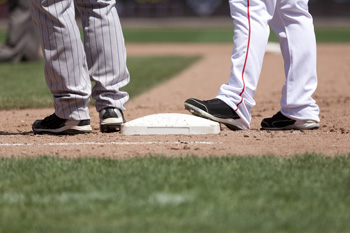 First baseman Ryan Zimmerman of the Washington Nationals has suffered a “brutal” season due to plantar fasciitis in his right foot. The condition made Zimmerman’s returns to the field slow. The nature of the athlete’s injury has also made it slow to heal; fully torn plantar fascia are faster to heal, but Zimmerman’s fascia was only partly torn. Before his return on September 1st, Zimmerman rehabilitated on the treadmill. Plantar fasciitis is a common sports injury that can be disruptive to everyday life. If you think you’ve sustained a plantar fasciitis injury, contact your podiatrist.
First baseman Ryan Zimmerman of the Washington Nationals has suffered a “brutal” season due to plantar fasciitis in his right foot. The condition made Zimmerman’s returns to the field slow. The nature of the athlete’s injury has also made it slow to heal; fully torn plantar fascia are faster to heal, but Zimmerman’s fascia was only partly torn. Before his return on September 1st, Zimmerman rehabilitated on the treadmill. Plantar fasciitis is a common sports injury that can be disruptive to everyday life. If you think you’ve sustained a plantar fasciitis injury, contact your podiatrist.
Plantar fasciitis can be very painful and inconvenient. If you are experiencing heel pain or symptoms of plantar fasciitis, contact Brent Harwood, DPM from Southeast Podiatry. Our doctor can provide the care you need to keep you pain-free and on your feet.
What Is Plantar Fasciitis?
Plantar fasciitis is the inflammation of the thick band of tissue that runs along the bottom of your foot, known as the plantar fascia, and causes mild to severe heel pain.
What Causes Plantar Fasciitis?
How Can It Be Treated?
While very treatable, plantar fasciitis is definitely not something that should be ignored. Especially in severe cases, speaking to your doctor right away is highly recommended to avoid complications and severe heel pain. Your podiatrist can work with you to provide the appropriate treatment options tailored to your condition.
If you have any questions please feel free to contact one of our offices located in Fairhope, Brewton, and Atmore, AL . We offer the newest diagnostic and treatment technologies for all your foot care needs.
Read more about Plantar Fasciitis Patients who are overweight may notice they frequently experience foot pain. This can be a result of the added weight the feet must endure on a daily basis. Additionally, there are uncomfortable foot conditions that may develop which can include plantar fasciitis, arthritis, and tendinitis. These can compromise the ability to complete daily activities. Obese patients may have flat feet, and this may produce considerable pain and discomfort. Other medical conditions that can develop from being overweight are gout, diabetes, and circulation ailments. If you have questions about how obesity can affect the feet, it is strongly advised that you seek the counsel of a podiatrist.
Patients who are overweight may notice they frequently experience foot pain. This can be a result of the added weight the feet must endure on a daily basis. Additionally, there are uncomfortable foot conditions that may develop which can include plantar fasciitis, arthritis, and tendinitis. These can compromise the ability to complete daily activities. Obese patients may have flat feet, and this may produce considerable pain and discomfort. Other medical conditions that can develop from being overweight are gout, diabetes, and circulation ailments. If you have questions about how obesity can affect the feet, it is strongly advised that you seek the counsel of a podiatrist.
The more you weigh, the harder your feet must work to support your body. If you’re an obese individual and are concerned about your feet, contact Brent Harwood, DPM from Southeast Podiatry. Our doctor can provide the care you need to keep you pain-free and on your feet.
Obesity and Your Feet
People who are overweight are putting more pressure on their , knees, and hips as well as their feet. This unfortunately can lead to variety of different issues.
Problems & Complications Stemming from Obesity
If you have any questions, please feel free to contact one of our offices located in Fairhope, Brewton, and Atmore, AL . We offer the newest diagnostic and treatment technologies for all your foot care needs.
Read more about Obesity and the Feet Research has indicated when children's feet receive proper care, potential foot problems that can develop as adults may diminish. When children get into the habit of washing and drying their feet on a daily basis, foot conditions, including athlete’s foot, may be prevented. Children’s feet will benefit from walking barefoot while indoors. This helps the toes to become strong by grasping the floor. When it is time to walk outdoors, it is important to have your child’s feet properly measured. This can help to determine the correct size shoe to ensure comfortable walking. The unpleasant foot condition, known as ingrown toenails, may be prevented when the toenails are trimmed straight across the toe. Please consult with a podiatrist if you would like additional information about foot care for children.
Research has indicated when children's feet receive proper care, potential foot problems that can develop as adults may diminish. When children get into the habit of washing and drying their feet on a daily basis, foot conditions, including athlete’s foot, may be prevented. Children’s feet will benefit from walking barefoot while indoors. This helps the toes to become strong by grasping the floor. When it is time to walk outdoors, it is important to have your child’s feet properly measured. This can help to determine the correct size shoe to ensure comfortable walking. The unpleasant foot condition, known as ingrown toenails, may be prevented when the toenails are trimmed straight across the toe. Please consult with a podiatrist if you would like additional information about foot care for children.
Making sure that your children maintain good foot health is very important as they grow. If you have any questions, contact Brent Harwood, DPM of Southeast Podiatry. Our doctor can provide the care you need to keep you pain-free and on your feet.
Keeping Children's Feet Healthy
Having healthy feet during childhood can help prevent medical problems later in life, namely in the back and legs. As children grow, their feet require different types of care. Here are some things to consider...
Although babies do not walk yet, it is still very important to take care of their feet.
Avoid putting tight shoes or socks on his or her feet.
Allow the baby to stretch and kick his or her feet to feel comfortable.
As a toddler, kids are now on the move and begin to develop differently. At this age, toddlers are getting a feel for walking, so don’t be alarmed if your toddler is unsteady or ‘walks funny’.
As your child gets older, it is important to teach them how to take care of their feet.
Show them proper hygiene to prevent infections such as fungus.
Be watchful for any pain or injury.
Have all injuries checked by a doctor as soon as possible.
Comfortable, protective shoes should always be worn, especially at play.
If you have any questions please feel free to contact one of our offices located in Fairhope, Brewton, and Atmore, AL . We offer the newest diagnostic and treatment technologies for all your foot care needs.
Read more about What to Do to Keep Your Child’s Feet Healthy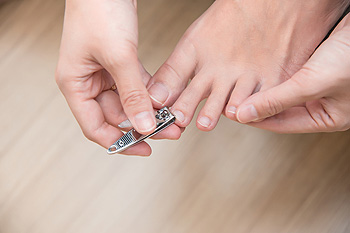 The feet are considered to be the foundation of the body, and it is important to maintain proper foot care. This includes washing and drying your feet completely, which may be beneficial in preventing athlete’s foot from developing. Foot odor may be avoided when the socks are changed daily. The overall feeling of the feet may improve when proper size shoes are worn. Research has indicated it is beneficial to purchase shoes in the afternoon, when the feet are at their largest. Additionally, it is helpful to wear high heels and flip flops for limited amounts of time because of the inadequate support these shoes typically provide. If you would like additional information about how to care for you feet, it is suggested that you schedule a consultation with a podiatrist who can provide you with the correct knowledge.
The feet are considered to be the foundation of the body, and it is important to maintain proper foot care. This includes washing and drying your feet completely, which may be beneficial in preventing athlete’s foot from developing. Foot odor may be avoided when the socks are changed daily. The overall feeling of the feet may improve when proper size shoes are worn. Research has indicated it is beneficial to purchase shoes in the afternoon, when the feet are at their largest. Additionally, it is helpful to wear high heels and flip flops for limited amounts of time because of the inadequate support these shoes typically provide. If you would like additional information about how to care for you feet, it is suggested that you schedule a consultation with a podiatrist who can provide you with the correct knowledge.
Everyday foot care is very important to prevent infection and other foot ailments. If you need your feet checked, contact Brent Harwood, DPM from Southeast Podiatry. Our doctor can provide the care you need to keep you pain-free and on your feet.
Everyday Foot Care
Often, people take care of their bodies, face and hair more so than they do for their feet. But the feet are a very important aspect of our bodies, and one that we should pay more attention to. Without our feet, we would not be able to perform most daily tasks.
It is best to check your feet regularly to make sure there are no new bruises or cuts that you may not have noticed before. For dry feet, moisturizer can easily be a remedy and can be applied as often as necessary to the affected areas. Wearing shoes that fit well can also help you maintain good foot health, as well as making it easier to walk and do daily activities without the stress or pain of ill-fitting shoes, high heels, or even flip flops. Wearing clean socks with closed shoes is important to ensure that sweat and bacteria do not accumulate within the shoe. Clean socks help to prevent Athlete’s foot, fungi problems, bad odors, and can absorb sweat.
If you have any questions please feel free to contact one of our offices located in Fairhope, Brewton, and Atmore, AL . We offer the newest diagnostic and treatment technologies for all your foot and ankle needs.
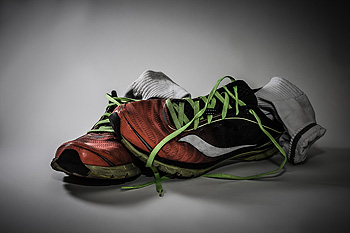 If you have noticed excessive sweat coming from your feet, you may have a medical condition that is known as plantar hyperhidrosis. It can occur as a result of an overactive nervous system, obesity, or a thyroid disorder. There are disadvantages to having this condition, including slipping in open shoes that may cause the to twist, or the foot slipping off the brake while attempting to stop the car. There are treatment options that do not require surgery which may help to obtain mild relief. These can include taking anti-anxiety drugs, botox injections, or taking specific medications that can induce drying. For severe cases, surgery may be a viable option which can include cutting the affected nerve. If you are suffering from this uncomfortable condition, it is strongly advised that you speak to a podiatrist who can offer the best treatment for you.
If you have noticed excessive sweat coming from your feet, you may have a medical condition that is known as plantar hyperhidrosis. It can occur as a result of an overactive nervous system, obesity, or a thyroid disorder. There are disadvantages to having this condition, including slipping in open shoes that may cause the to twist, or the foot slipping off the brake while attempting to stop the car. There are treatment options that do not require surgery which may help to obtain mild relief. These can include taking anti-anxiety drugs, botox injections, or taking specific medications that can induce drying. For severe cases, surgery may be a viable option which can include cutting the affected nerve. If you are suffering from this uncomfortable condition, it is strongly advised that you speak to a podiatrist who can offer the best treatment for you.
If you are suffering from hyperhidrosis contact Brent Harwood, DPM of Southeast Podiatry. Our doctor can provide the care you need to attend to all of your foot care needs.
Hyperhidrosis of the Feet
Hyperhidrosis is a rare disorder that can cause people to have excessive sweating of their feet. This can usually occur all on its own without rigorous activity involved. People who suffer from hyperhidrosis may also experience sweaty palms.
Although it is said that sweating is a healthy process meant to cool down the body temperature and to maintain a proper internal temperature, hyperhidrosis may prove to be a huge hindrance on a person’s everyday life.
Plantar hyperhidrosis is considered to be the main form of hyperhidrosis. Secondary hyperhidrosis can refer to sweating that occurs in areas other than the feet or hands and armpits. Often this may be a sign of it being related to another medical condition such as menopause, hyperthyroidism and even Parkinson’s disease.
In order to alleviate this condition, it is important to see your doctor so that they may prescribe the necessary medications so that you can begin to live a normal life again. If this is left untreated, it is said that it will persist throughout an individual’s life.
A last resort approach would be surgery, but it is best to speak with your doctor to find out what may be the best treatment for you.
If you have any questions please feel free to contact one of our offices located in Fairhope, Brewton, and Atmore, AL . We offer the newest diagnostic and treatment technologies for all your foot care needs.
Read more about Hyperhidrosis of the Feet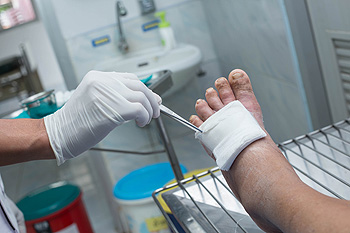 Patients with diabetes are often familiar with foot conditions that can develop as a result of this affliction. Research has indicated the importance of having regular foot examinations, as this can be helpful in noticing any cuts or wounds that have developed on the feet. Diabetes can produce tingling and numbing sensations in the feet. This may cause difficulty in feeling any cuts that are present on the feet, which can lead to infections. If the cuts are not properly cared for, foot ulcers may develop and gangrene may gradually develop. If you have diabetes, it is advised that you be under the care of a podiatrist who can manage this condition.
Patients with diabetes are often familiar with foot conditions that can develop as a result of this affliction. Research has indicated the importance of having regular foot examinations, as this can be helpful in noticing any cuts or wounds that have developed on the feet. Diabetes can produce tingling and numbing sensations in the feet. This may cause difficulty in feeling any cuts that are present on the feet, which can lead to infections. If the cuts are not properly cared for, foot ulcers may develop and gangrene may gradually develop. If you have diabetes, it is advised that you be under the care of a podiatrist who can manage this condition.
Diabetic foot care is important in preventing foot ailments such as ulcers. If you are suffering from diabetes or have any other concerns about your feet, contact Brent Harwood, DPM from Southeast Podiatry. Our doctor can provide the care you need to keep you pain-free and on your feet.
Diabetic Foot Care
Diabetes affects millions of people every year. The condition can damage blood vessels in many parts of the body, especially the feet. Because of this, taking care of your feet is essential if you have diabetes, and having a podiatrist help monitor your foot health is highly recommended.
The Importance of Caring for Your Feet
Patients with diabetes should have their doctor monitor their blood levels, as blood sugar levels play such a huge role in diabetic care. Monitoring these levels on a regular basis is highly advised.
It is always best to inform your healthcare professional of any concerns you may have regarding your feet, especially for diabetic patients. Early treatment and routine foot examinations are keys to maintaining proper health, especially because severe complications can arise if proper treatment is not applied.
If you have any questions please feel free to contact one of our offices located in Fairhope, Brewton, and Atmore, AL . We offer the newest diagnostic and treatment technologies for all your foot care needs.
Read more about Diabetic Foot ConditionsThe symptoms of an ingrown toenail can be quite noticeable. They typically consist of red and swollen skin on the sides of the big toe, and it generally causes pain and discomfort. It can occur as a result of wearing shoes that do not fit properly, and this can possibly cause the toenail to grow into the surrounding skin. If your child has an ingrown toenail, they may find mild relief when the affected toe is soaked in warm water. This may help to move the swollen portion of skin away from the nail. It may be beneficial to wear sandals as the healing process occurs, and this can help to keep pressure off of the nail. If you are afflicted with an ingrown toenail, it is strongly advised that you seek the counsel of a podiatrist who can properly treat this condition.
Ingrown toenails can become painful if they are not treated properly. For more information about ingrown toenails, contact Brent Harwood, DPM of Southeast Podiatry. Our doctor can provide the care you need to keep you pain-free and on your feet.
Ingrown Toenails
Ingrown toenails occur when a toenail grows sideways into the bed of the nail, causing pain, swelling, and possibly infection.
Causes
Prevention
Because ingrown toenails are not something found outside of shoe-wearing cultures, going barefoot as often as possible will decrease the likeliness of developing ingrown toenails. Wearing proper fitting shoes and using proper cutting techniques will also help decrease your risk of developing ingrown toenails.
Treatment
Ingrown toenails are a very treatable foot condition. In minor cases, soaking the affected area in salt or antibacterial soaps will not only help with the ingrown nail itself, but also help prevent any infections from occurring. In more severe cases, surgery is an option. In either case, speaking to your podiatrist about this condition will help you get a better understanding of specific treatment options that are right for you.
If you have any questions please feel free to contact one of our offices located in Fairhope, Brewton, and Atmore, AL . We offer the newest diagnostic and treatment technologies for all your foot care needs.
Read more about Ingrown Toenail CareFoot massages have become increasingly popular, and research has indicated it may help to heal ailments in other parts of the body. When the toes are curled, and the portion of the foot is massaged under the ball of the foot, this may aid in reducing anxiety. Patients who are suffering from chronic pain in the body may find that rolling the sole of the foot on a tennis ball could bring mild relief. Lower back pain may be diminished when the pressure points in the arches are massaged, followed by firmly rubbing the entire sole of the foot. If you are diabetic, it is suggested that you seek the counsel of a podiatrist who can provide information about how nerves that are damaged can be affected by massaging.
Foot therapy is often necessary for those recovering from either foot deformities or foot injuries. If you have concerns regarding therapy, Brent Harwood, DPM of Southeast Podiatry. Our doctor can provide the care you need to keep you pain-free and on your feet.
Most Common Injuries
People who are active or athletes are prone to a variety of injuries. Therefore, it is often important to take part in physical therapy in order to quickly get back on the right track.
What to Do When Injured
Physical Therapy – This specialized treatment will focus on the affected area, speeding up recovery and the overall healing process. It is a proven method that has helped millions of people return from any injury.
During physical therapy you will undergo regimented training to get back into full form. Training is often very difficult, especially at first when the foot feels weak. Physical therapy often involves:
Basic stretching and twisting exercises – getting the feet’s mobility and flexibility up.
Massaging – the therapist will massage the injured area in order to activate the muscles and relax them.
Strengthening Exercises – this allows the muscles in the affected area to regain their full strength, a vital step towards full recovery.
If you have any questions please feel free to contact one of our offices located in Fairhope, Brewton, and Atmore, AL . We offer the newest diagnostic tools and technology to treat your foot care needs.
Read more about Foot Therapy for Sports Injuries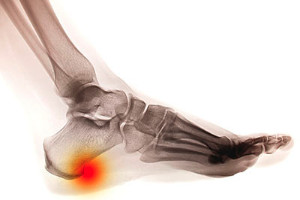 Many patients have pain in the heel area of the foot, and this may be indicative of condition that is known as a heel spur. It is considered to be a bony growth that forms underneath the heel and may be hooked or pointed. It grows toward the middle of the foot and can cause pain in the arch. The symptoms that are associated with heel spurs often include heel pain upon arising in the morning, swelling and heat coming from the affected heel, and the foot may feel achy as the day progresses. It can develop for a variety of reasons. These can consist of an injury that has occurred to the heel, participating in running and jumping activities, and wearing shoes that do not fit correctly. If you feel you may have developed a heel spur, it is advised to seek the counsel of a podiatrist who can determine what the best treatment is for you.
Many patients have pain in the heel area of the foot, and this may be indicative of condition that is known as a heel spur. It is considered to be a bony growth that forms underneath the heel and may be hooked or pointed. It grows toward the middle of the foot and can cause pain in the arch. The symptoms that are associated with heel spurs often include heel pain upon arising in the morning, swelling and heat coming from the affected heel, and the foot may feel achy as the day progresses. It can develop for a variety of reasons. These can consist of an injury that has occurred to the heel, participating in running and jumping activities, and wearing shoes that do not fit correctly. If you feel you may have developed a heel spur, it is advised to seek the counsel of a podiatrist who can determine what the best treatment is for you.
Heel spurs can be incredibly painful and sometimes may make you unable to participate in physical activities. To get medical care for your heel spurs, contact Brent Harwood, DPM from Southeast Podiatry. Our doctor will do everything possible to treat your condition.
Heels Spurs
Heel spurs are formed by calcium deposits on the back of the foot where the heel is. This can also be caused by small fragments of bone breaking off one section of the foot, attaching onto the back of the foot. Heel spurs can also be bone growth on the back of the foot and may grow in the direction of the arch of the foot.
Older individuals usually suffer from heel spurs and pain sometimes intensifies with age. One of the main condition's spurs are related to is plantar fasciitis.
Pain
The pain associated with spurs is often because of weight placed on the feet. When someone is walking, their entire weight is concentrated on the feet. Bone spurs then have the tendency to affect other bones and tissues around the foot. As the pain continues, the feet will become tender and sensitive over time.
Treatments
There are many ways to treat heel spurs. If one is suffering from heel spurs in conjunction with pain, there are several methods for healing. Medication, surgery, and herbal care are some options.
If you have any questions feel free to contact one of our offices located in Fairhope, Brewton, and Atmore, AL . We offer the latest in diagnostic and treatment technology to meet your needs.
Read more about Heel Spurs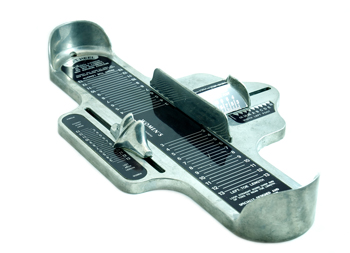 It is beneficial to maintain proper foot care which can be helpful in accomplishing daily activities. Choosing a correct shoe size is important in preventing uncomfortable foot conditions from developing. Many people find it useful to measure the feet using a Brannock device, as this will help in determining the correct shoe size. It is important to try shoes on at the end of the day, because this can help to ensure the shoes will fit properly when the feet are at their largest. Additionally, there needs to be adequate room in the tip of the shoe, so the toes can move freely. Both shoes should be tried on and walked in before purchasing them, and if the footwear is made of a soft, leather material, it may reduce the possibility of getting skin irritations. Many people find it easier to find shoes that fit well if a shoe is shaped like the foot. If you would like additional information about the importance of wearing shoes that fit properly, please consult with a podiatrist.
It is beneficial to maintain proper foot care which can be helpful in accomplishing daily activities. Choosing a correct shoe size is important in preventing uncomfortable foot conditions from developing. Many people find it useful to measure the feet using a Brannock device, as this will help in determining the correct shoe size. It is important to try shoes on at the end of the day, because this can help to ensure the shoes will fit properly when the feet are at their largest. Additionally, there needs to be adequate room in the tip of the shoe, so the toes can move freely. Both shoes should be tried on and walked in before purchasing them, and if the footwear is made of a soft, leather material, it may reduce the possibility of getting skin irritations. Many people find it easier to find shoes that fit well if a shoe is shaped like the foot. If you would like additional information about the importance of wearing shoes that fit properly, please consult with a podiatrist.
Finding a properly-fitting shoe is important in reducing injuries and preventing foot problems. For more information about treatment, contact Brent Harwood, DPM from Southeast Podiatry. Our doctor will treat your foot care needs.
Proper Shoe Fitting
A common concern when it comes to foot health, having properly fitted shoes can help prevent injuries to the foot. Out feet affect our posture and gait, which in turn affects the biomechanics and overall bodily structure. With 33 joints, 26 bones, and over 100 ligaments, the potential for serious injury is much greater than one realizes. Although the feet cease growth in adulthood, they still change shape as they mature. Here are some factors to consider when it comes to investing in proper fitting shoes:
Keeping in mind how shoes fit the biomechanics of your body, properly-fitting shoes are vitally important. Fortunately, it is not difficult to acquire footwear that fits correctly. Be sure to wear shoes that support the overall structure of your body. Do your feet a favor and invest in several pairs of well-fitted shoes today.
If you have any questions please feel free to contact one of our offices located in Fairhope, Brewton, and Atmore, AL . We offer the newest diagnostic and treatment technologies for all your foot care needs.
Read more about Proper Shoe Fitting